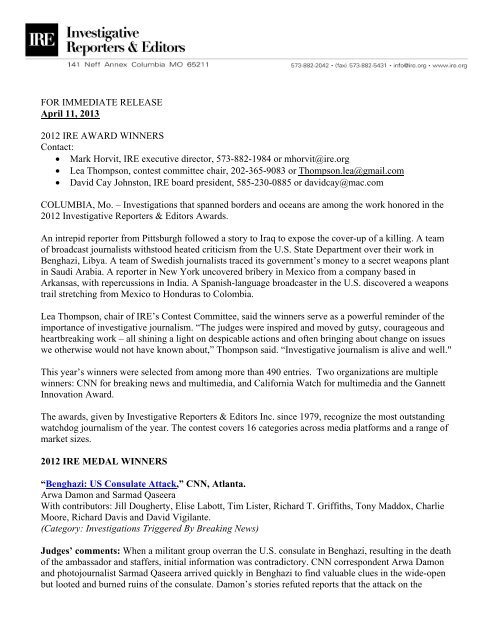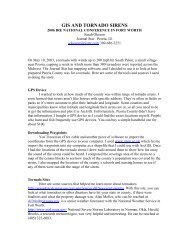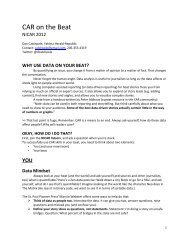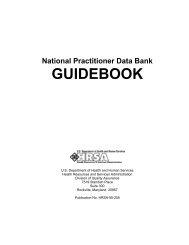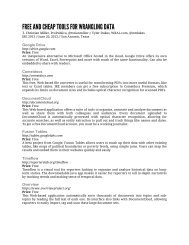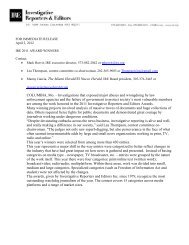Read IRE's press release about this year's awards. - Investigative ...
Read IRE's press release about this year's awards. - Investigative ...
Read IRE's press release about this year's awards. - Investigative ...
You also want an ePaper? Increase the reach of your titles
YUMPU automatically turns print PDFs into web optimized ePapers that Google loves.
FOR IMMEDIATE RELEASE<br />
April 11, 2013<br />
2012 IRE AWARD WINNERS<br />
Contact:<br />
• Mark Horvit, IRE executive director, 573-882-1984 or mhorvit@ire.org<br />
• Lea Thompson, contest committee chair, 202-365-9083 or Thompson.lea@gmail.com<br />
• David Cay Johnston, IRE board president, 585-230-0885 or davidcay@mac.com<br />
COLUMBIA, Mo. – Investigations that spanned borders and oceans are among the work honored in the<br />
2012 <strong>Investigative</strong> Reporters & Editors Awards.<br />
An intrepid reporter from Pittsburgh followed a story to Iraq to expose the cover-up of a killing. A team<br />
of broadcast journalists withstood heated criticism from the U.S. State Department over their work in<br />
Benghazi, Libya. A team of Swedish journalists traced its government’s money to a secret weapons plant<br />
in Saudi Arabia. A reporter in New York uncovered bribery in Mexico from a company based in<br />
Arkansas, with repercussions in India. A Spanish-language broadcaster in the U.S. discovered a weapons<br />
trail stretching from Mexico to Honduras to Colombia.<br />
Lea Thompson, chair of IRE’s Contest Committee, said the winners serve as a powerful reminder of the<br />
importance of investigative journalism. “The judges were inspired and moved by gutsy, courageous and<br />
heartbreaking work – all shining a light on despicable actions and often bringing <strong>about</strong> change on issues<br />
we otherwise would not have known <strong>about</strong>,” Thompson said. “<strong>Investigative</strong> journalism is alive and well."<br />
This year’s winners were selected from among more than 490 entries. Two organizations are multiple<br />
winners: CNN for breaking news and multimedia, and California Watch for multimedia and the Gannett<br />
Innovation Award.<br />
The <strong>awards</strong>, given by <strong>Investigative</strong> Reporters & Editors Inc. since 1979, recognize the most outstanding<br />
watchdog journalism of the year. The contest covers 16 categories across media platforms and a range of<br />
market sizes.<br />
2012 IRE MEDAL WINNERS<br />
“Benghazi: US Consulate Attack,” CNN, Atlanta.<br />
Arwa Damon and Sarmad Qaseera<br />
With contributors: Jill Dougherty, Elise Labott, Tim Lister, Richard T. Griffiths, Tony Maddox, Charlie<br />
Moore, Richard Davis and David Vigilante.<br />
(Category: Investigations Triggered By Breaking News)<br />
Judges’ comments: When a militant group overran the U.S. consulate in Benghazi, resulting in the death<br />
of the ambassador and staffers, initial information was contradictory. CNN correspondent Arwa Damon<br />
and photojournalist Sarmad Qaseera arrived quickly in Benghazi to find valuable clues in the wide-open<br />
but looted and burned ruins of the consulate. Damon’s stories refuted reports that the attack on the
consulate was part of larger anti-American demonstrations throughout the Middle East. Damon’s<br />
courageous reporting showed it appeared to be a planned attack that came after U.S. diplomats had been<br />
warned days before by Libyan officials <strong>about</strong> the deteriorating security there. The network stood firm in<br />
the face of harsh criticism from the State Department. The U.S. government’s investigation later proved<br />
CNN’s reporting to be accurate. Damon also spoke to Libyans who tried to save the ambassador that<br />
night, shedding light on what happened to him during his final hours. Her reporting provided additional<br />
valuable context <strong>about</strong> the milieu in which the consulate attack occurred.<br />
“Project Simoom,” Sverige Radio, Stockholm.<br />
Bo-Göran Bodin, Daniel Öhman and Rolf Stengård.<br />
(Category: Radio)<br />
Judges’ comments: In a tour de force of journalism enterprise, Swedish Radio News reporters uncovered<br />
one of the most secretive projects in Sweden: the illegal financing and construction of an advanced<br />
weapons factory in the Saudi Arabian desert in violation of the country’s strict human rights criteria.<br />
Unbeknownst to citizens and the elected officials of Sweden’s Parliament, the country’s Defense<br />
Department set up a dummy corporation and used military intelligence cash to hide the government’s<br />
complicity in its secret partnership with the Saudi government. With dogged determination and armed<br />
with documents they obtained through various sources, the station peeled away the layers of secrecy. In a<br />
gripping storytelling style, the reporters took listeners on their investigative journey as they pursued<br />
reluctant sources who confirmed they worked on the project. These reporters stood their ground as the<br />
defense minister repeatedly lied <strong>about</strong> the existence of such a project, even when confronted with the<br />
official documents. Their reporting led to the resignation of the defense minister and his staff and the<br />
cancellation of the controversial weapons factory project. The judges commend Swedish radio for not<br />
only its fine reporting but it’s superb storytelling and production.<br />
FOI AWARD<br />
“Empty-Desk Epidemic,” The Chicago Tribune.<br />
David Jackson, Gary Marx and Alex Richards.<br />
Judges’ comments: For years, Chicago school officials routinely published positive statistics <strong>about</strong><br />
school attendance. But reporter David Jackson was determined to discover the real situation, and for more<br />
than a decade, relentlessly and creatively demanded records from the secretive school board. His findings<br />
revealed a crisis in the city’s schools. He showed roughly one in eight of the city’s K-8 students missed a<br />
month or more of class per year, while others simply vanished from school. The series exposed a<br />
devastating pattern of absenteeism and indifference by city officials who ignored or masked over the<br />
problem, and that left kids with time to get into trouble. IRE commends the Tribune team for refusing to<br />
take no for an answer and overcoming multiple open records denials.<br />
TOM RENNER AWARD<br />
“Locked Up,” USA Today.<br />
Brad Heath<br />
Judges’ comments: Reporter Brad Heath discovered dozens of men locked up on gun possession charges
even though a federal appeals court had concluded they had done no federal crime. Using tips from<br />
lawyers, inmates and families, and sifting through thousands of pages of court documents, Heath showed<br />
the Justice Department knew the prisoners were innocent of the charges, but made no effort to identify or<br />
alert people whose convictions should have been invalidated. Many of the prisoners didn’t realize they<br />
were innocent until USA TODAY contacted them. He also found prosecutors were persuading courts to<br />
keep sex offenders in prison past the expiration of their sentences based on questionable psychological<br />
assessments. Heath’s dogged reporting exposed shortcomings in the criminal justice system and resulted<br />
in the <strong>release</strong> of at least 32 federal prisoners and the end of supervised <strong>release</strong> for 12 others. IRE<br />
commends Heath for digging for the truth to correct an unbelievable breakdown in the justice system.<br />
------<br />
2012 IRE WINNERS BY CATEGORY<br />
PRINT/ONLINE – LARGE<br />
“Wal-Mart Abroad: How a Retail Giant Fueled Growth With Bribes,” The New York Times.<br />
David Barstow and Alejandra Xanic von Bertrab<br />
Judges comments: This two-part New York Times series on Wal-Mart’s practices in Mexico drew back<br />
the curtain on a corporate giant’s pattern of bribery within its largest foreign subsidiary, Wal-Mart de<br />
Mexico. The stories by David Barstow and Alejandra Xanic von Bertrab began with a tip and a handful of<br />
documents. Their determined effort eventually led to 600 public records requests in Mexico, producing<br />
100,000 pages of records, and 200 interviews with government officials. Part One revealed how Wal-<br />
Mart’s top executives shut down an internal investigation that had found evidence of systemic bribery.<br />
Part Two offered an in-depth examination of how the company used bribes to accelerate its growth in<br />
Mexico. The stories prompted investigations by the U.S. Department of Justice, the SEC and Mexican<br />
authorities. The stories also spurred the company to conduct an internal investigation that led to findings<br />
of potential violations of the Foreign Corrupt Practices Act in Mexico, India and China.<br />
PRINT/ONLINE – MEDIUM<br />
“Rules of Engagement,” Pittsburgh Tribune-Review.<br />
Carl Prine.<br />
Judges’ comments: A stunning example of good, old-fashioned, shoe-leather reporting. Reporter Carl<br />
Prine got a tip he relentlessly pursued in the face of enormous obstacles and personal peril. Prine, himself<br />
a military veteran, spent two years traveling across America and deep into Iraq to prove the story of how a<br />
U.S. Army staff sergeant fatally shot two innocent deaf mute Iraqi children and ordered the slaying of<br />
their handicapped cousin. The stories also charted an ongoing Army cover-up of the killings, false<br />
battlefield decorations and the accused gunman’s promotion. When the subject of the series made threats<br />
against the reporter and his wife, Prine wrote <strong>about</strong> that too. A courageous story and a wonderfully spun<br />
tale.<br />
PRINT/ONLINE – SMALL<br />
“Hidden Suffering, Hidden Death,” Belleville News Democrat (Illinois).<br />
George Pawlaczyk, Beth Hundsdorfer<br />
Judges’ comments: This investigation focused a bright light on an outrage in Illinois. The deaths of
severely disabled adults being cared for in their own homes were not being investigated by the state<br />
agency designed to protect them. Phone calls reporting abuse, neglect and horrific living conditions came<br />
into a state hotline, but were often ignored –under the reasoning that they were “ineligible for services.”<br />
Facing major roadblocks and government intimidation, George Pawlaczyk and Beth Hundsdorfer<br />
persevered to tell heartbreaking tales of Illinois residents who died under terrible circumstances. The<br />
stories led to the resignation of the agency’s inspector general, and the governor ordered a revamp of the<br />
agency.<br />
BOOK<br />
The Lost Bank: The Story of Washington Mutual—The Biggest Bank Failure in American History<br />
Kirsten Grind.<br />
Judges’ comments: As banks across the United States failed through a combination of greed,<br />
mismanagement and circumstances beyond their control, Kirsten Grind became one of the first to publish<br />
a meaningful post-mortem. She dug into the collapse of Washington Mutual, the largest bank failure in<br />
America, with skill and determination, bringing characters and events to life with an effective use of<br />
records and interviews. With crisp writing befitting a novel, she recreates a frightening drama that should<br />
have served as a warning to legislators and regulators that too-good-to-be-true home loans would<br />
contribute mightily to the collapse of the economy.<br />
BROADCAST/VIDEO – LARGE<br />
"Rápido y Furioso" ("Fast & Furious"), Aquí y Ahora de Univision (the newsmagazine “Here and<br />
Now”).<br />
Gerardo Reyes, Tomás Ocaña, Mariana Atencio, María Antonieta Collins, Tifani Roberts, Vytenis<br />
Didziulis, Margarita Rabin<br />
Judges’ Comments: In a yearlong investigation, hundreds of classified Mexican documents were<br />
obtained with great difficulty under the Mexican public access law. A database of 60,000 entries was<br />
combined with US government documents to find 57 previously unreported lost weapons under the “Fast<br />
and Furious” program and to show the depth in human cost. Univision detailed previously unknown<br />
crimes committed with those weapons - including the shooting of 14 teens at a birthday party – and<br />
uncovered similar U.S. programs in Colombia, Honduras and Puerto Rico that also went awry. As a result<br />
of Univision’s diligence, the Mexican Congress asked for economic compensation for the victims of<br />
massacres in which guns from the "Fast and Furious" operation were used. A public debate erupted in<br />
Mexico on how much the Mexican government knew. Congress <strong>press</strong>ed the U.S. Justice Department for<br />
more information, and one U..S Congressman called “Rápido y Furioso” the “Holy Grail” that broke the<br />
case.<br />
BROADCAST/VIDEO – MEDIUM<br />
“Unfair Game,” WFAA- Dallas.<br />
Brett Shipp, Billy Bryant and Jason Trahan<br />
Judges’ comments: “Unfair Game” showed how Texas high school coaches and administrators openly<br />
flouted the rules and helped students transfer school districts to assemble state championship-caliber<br />
athletic teams. The stories graphically showed how improper recruiting helped Dallas' Kimball Knights<br />
build back-to-back state championship basketball teams, and how former Dallas Cowboy Deion Sanders'<br />
new school, Prime Prep Academy, drew in blue-chip players against the rules. Because public records
were sparse, reporter Brett Shipp used an inventive combination of social media and dogged reporting to<br />
show how high school athletics had been transformed into a business in which the best players were lured<br />
away from their neighborhood schools and sometimes across state lines. Results included the firing of one<br />
coach and an internal investigation that concluded the Dallas district had violated federal rules.<br />
BROADCAST/VIDEO – SMALL<br />
“War Zone: The Destruction of an All-American City,” KMOV-St. Louis.<br />
Craig Cheatham and Jim Thomas.<br />
Judge’s comments: This hour-long documentary is a stunning compilation of a two-year investigation<br />
into how political corruption is destroying East St. Louis, Ill. Reporter Craig Cheatham’s dogged<br />
reporting and hard-hitting questions appear to get inside the minds of hardened politicos who admit to<br />
him their wrongdoing. As part of a remarkable volume of reporting, Cheatham shows how politicians are<br />
connected to slumlords who own some of the worst housing in the region. The documentary finishes by<br />
exposing how certain tax breaks allow vice-driven businesses like strip clubs and a casino to flourish<br />
while not providing needed jobs. Well shot and finely written, the reporting resulted in the resignation of<br />
a police chief from two different jurisdictions as well as criminal charges and investigations against the<br />
slumlords.<br />
MULTIPLATFORM – LARGE<br />
(TIE)<br />
“Big Sky, Big Money,” PBS Frontline, American Public Media’s Marketplace and ProPublica.<br />
FRONTLINE: Rick Young, Anthony Szulc, Emma Schwartz, Fritz Kramer, Philip Bennett, Michael<br />
Sullivan, Raney Aronson-Rath and David Fanning. Marketplace: Kai Ryssdal, Megan Larson, Matt<br />
Berger, Deborah Clark and J.J. Yore. ProPublica: Kim Barker, Justin Elliott, Olga Pierce, Lois Beckett,<br />
Eric Umansky, Robin Fields and Steve Engelberg.<br />
Judges’ comments: This project featured multiple partners breaking down a complicated subject –<br />
campaign finance in the post-Citizens United era – in a simple, entertaining fashion. Big Money 2012<br />
tells a tale of money, politics and intrigue in a remote epicenter of campaign finance, Montana. The<br />
investigation led the teams from big sky country to a meth house in Colorado and to a UPS store in D.C.<br />
as they followed a trail of documents. What they found exposed the inner-workings of a dark money<br />
group. The investigation led to a Montana judicial ruling that Western Tradition Partnership violated the<br />
state’s campaign finance laws and the head of the organization resigned.<br />
“Mauritania: Slavery's Last Stronghold,” CNN Digital.<br />
John D. Sutter and Edythe McNamee<br />
Judges’ comments: In an investigation that upholds the highest ideals of journalism, CNN digital<br />
reporters John D. Sutter and Edythe McNamee gained access to the West African nation of Mauritania to<br />
put a human face on the shocking story of modern-day slavery. The country was the last in the world to<br />
outlaw slavery, doing so only five years ago. However, only one slave owner has been prosecuted for the<br />
practice and the tradition of slavery continues to dehumanize generations of the nation’s citizens. Sutter<br />
and McNamee gained access to Mauritania to work on a story <strong>about</strong> locust swarms. They had to do their
eporting on slavery covertly, often in the presence of a government-assigned minder. Their project was<br />
published online, accompanied by haunting photos and video. It also ran as a documentary on CNN<br />
International and CNN US. “Slavery’s Last Stronghold” included firsthand accounts from freed and<br />
escaped slaves both in Mauritania and in Ohio in the US and one man’s transformative journey from slave<br />
owner to abolitionist.<br />
MULTIPLATFORM – MEDIUM<br />
“Broken Shield,” California Watch.<br />
Ryan Gabrielson<br />
With contributors: Agustin Armendariz, Monica Lam, Michael Montgomery, Carrie Ching, Joanna Lin,<br />
Emily Hartley, Marie McIntosh, Nikki Frick, Christine Lee, Meghann Farnsworth, Cole Goins, Mia<br />
Zuckerkandel, La Toya Tooles, Robert Salladay, Mark Katches, Lauren Rabaino, Marina Luz and<br />
Brian Cragin.<br />
Judges’ comments: This is not only an important story examining egregious wrongdoing harming some<br />
of the most disadvantaged in society. This is a story of possible murder, multiple rapes and abuse all gone<br />
initially unreported and unanswered. The reporters left no stone unturned, including how one officer was<br />
logging 107 hours a week, every week. It is also an example of tireless digging for data over 18 months<br />
and methodology to be admired. As California Watch wrote in its entry, “Many of the victims chronicled<br />
by California Watch are so disabled they cannot utter a word. Gabrielson gave them a resounding voice.”<br />
The series prompted two new laws intended to bring great safeguards and accountability, a criminal<br />
investigation, new record keeping and staff retraining, the demotion of a police chief and more.<br />
MULTIPLATFORM – SMALL<br />
“Crunch Time,” Hoy Chicago and CU-CitizenAccess.org (Champaign- Urbana, Ill).<br />
HOY Contributors: Jeffrey Kelly Lowenstein, Samuel Vega, Roger Morales and Fernando Diaz.<br />
CU-CitizenAccess.org Contributors: Pamela Dempsey and Brant Houston.<br />
Judges’ comments: This partnership is a smart piece of accountability reporting <strong>about</strong> racial inequality<br />
that takes us inside a community through excellent video interviews and writing takes us inside a<br />
community. In the stringent enforcement of marijuana use, vehicular noise and other lesser crimes like<br />
jaywalking in Urbana-Champaign, Ill., <strong>this</strong> is a story of living in fear of the police. Though black people<br />
comprise only 16 percent of the population, they represent 40 percent of those arrested. The reporters<br />
published as they went, presenting a collaborative effort online and a 16-page bilingual supplement<br />
distributed in both the Chicago and Champaign-Urbana areas. “Crunch Time” sticks with you.<br />
STUDENT<br />
“Drug Under the Rug,” The Post, Ohio University.<br />
Alex Stuckey<br />
Judges’ comments: This four-month investigation by Alex Stuckey of The Post, Ohio University’s<br />
student newspaper, shows remarkable determination by a single student journalist following her instincts.<br />
The investigation began when Stuckey, working on a story <strong>about</strong> drug arrests, could not find records of<br />
items seized by the Athens County Sheriff’s Office, even though state law required those records be kept.<br />
Stuckey requested records from other area law enforcement agencies as well as the state Attorney<br />
General’s Office. She built her own database. Interviews combined with the records and data showed the<br />
sheriff and other agencies were failing to track seizures and forfeitures and in some cases could not
account for them at all. Stuckey’s investigation led to an audit by the county into the sheriff’s financial<br />
practices.<br />
GANNETT AWARD FOR INNOVATION IN WATCHDOG JOURNALISM<br />
“Broken Shield,” California Watch.<br />
Ryan Gabrielson<br />
With contributors: Agustin Armendariz, Monica Lam, Michael Montgomery, Carrie Ching, Joanna Lin,<br />
Emily Hartley, Marie McIntosh, Nikki Frick, Christine Lee, Meghann Farnsworth, Cole Goins, Mia<br />
Zuckerkandel, La Toya Tooles, Robert Salladay, Mark Katches, Lauren Rabaino, Marina Luz and<br />
Brian Cragin.<br />
Judges’ comments: In "Broken Shield," reporter Ryan Gabrielson tells the disturbing story of how a state<br />
police agency failed to protect some of California's most vulnerable residents. But California Watch didn't<br />
stop with the traditional story. It aggressively sought and measured impact. It created a graphic video to<br />
make the story more accessible. It held events to engage the public. It also published an e-book and sent<br />
out postcards to ensure that its message got out to as many people as possible. It is an im<strong>press</strong>ive package<br />
that shows that a journalist's work in many ways is just beginning with the publishing of a story.<br />
---------<br />
Contest entries are screened and judged by IRE members who are working journalists. The IRE Awards<br />
program is unique among journalism contests in the extent of its efforts to avoid conflicts of interest.<br />
Work that includes any significant role by a member of the IRE Board of Directors or an IRE contest<br />
judge may not be entered in the contest.<br />
This represents a significant sacrifice on the part of the individual — and often an entire newsroom —<br />
who may have done outstanding investigative work. For example, some work from The Miami Herald/El<br />
Nuevo Herald, USA Today, The Toronto Star, VoiceofSanDiego.com, The Washington Post, Arizona<br />
State University and News 21, Medill National Security Journalism Initiative, Florida Center for<br />
<strong>Investigative</strong> Reporting, the Milwaukee Journal-Sentinel, The New York Times, WCNC-Charlotte and<br />
the University of Nebraska was ineligible for entry in <strong>this</strong> year’s contest.<br />
IRE, founded in 1975, is a nonprofit professional organization dedicated to training and supporting<br />
journalists who pursue investigative stories, and it operates the National Institute for Computer-Assisted<br />
Reporting, a joint program of IRE and the Missouri School of Journalism.<br />
The IRE Awards will be presented at a luncheon on Saturday, June 22 at the 2013 IRE Conference in San<br />
Antonio, Texas.<br />
See the full list of winners, finalists and judges’ comments at:<br />
http://ire.org/<strong>awards</strong>/ire-<strong>awards</strong>/winners/2012-ire-award-winners/


